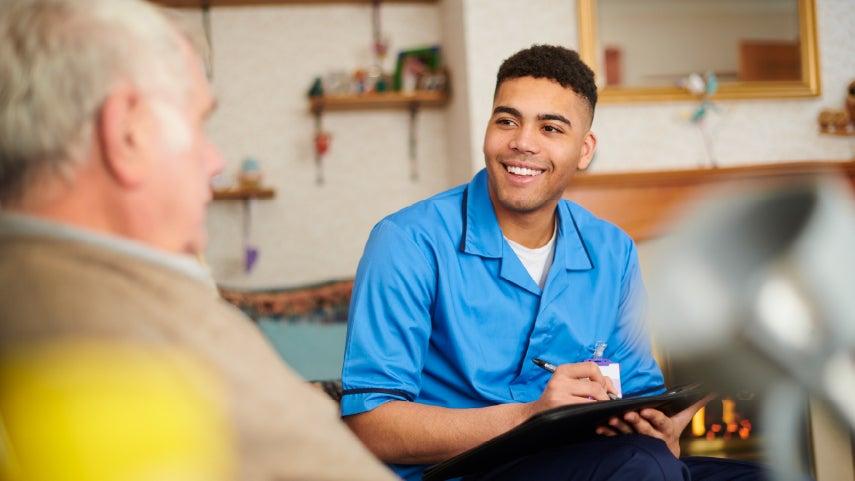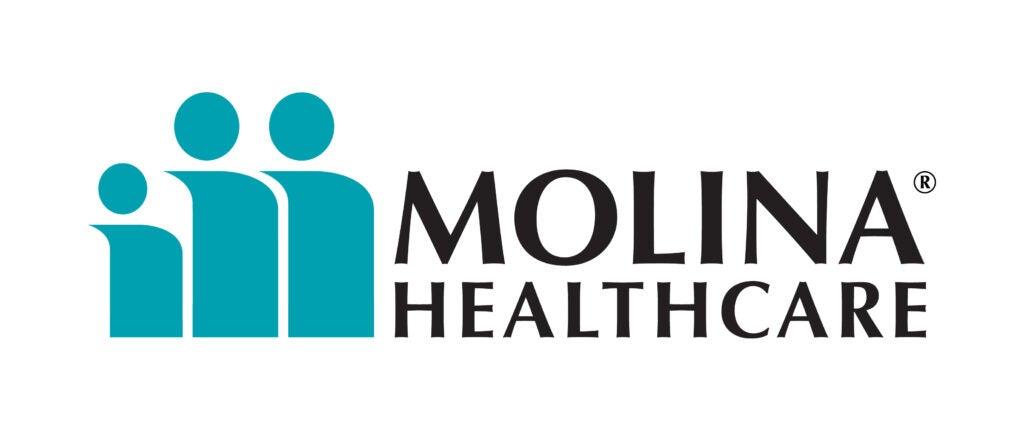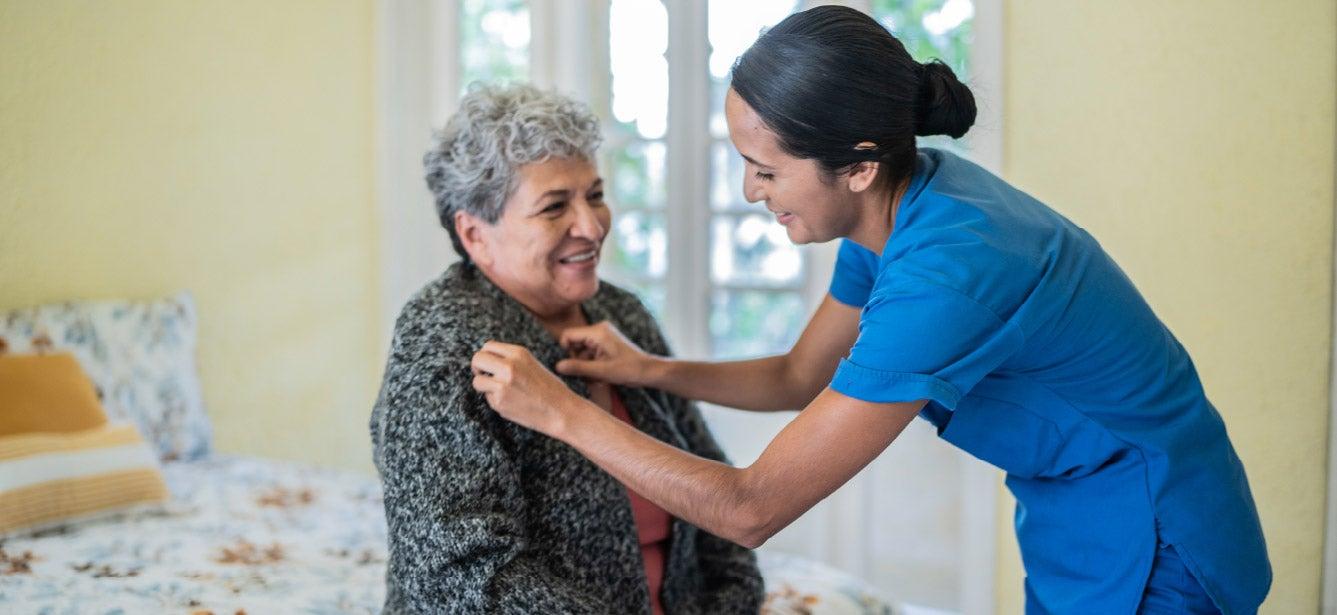
Related Topics
When you’re caring for a family member, sometimes you just need an extra set of hands—whether it’s for periodic respite care or more everyday flexibility. Having a compassionate, reliable care partner nearby can be beneficial for your quality of life as well as your care recipient’s.
Not sure where to begin? The steps below explain how to find a caregiver that’s a worthwhile addition to your relative’s care team.
Step 1 to finding a good caregiver: Assess your family member’s needs
When you’re hiring a caregiver for in-home help, the first step is to draw a clear picture of your care recipient’s needs. This involves defining the type and level of care they require:
- Define specific needs: The Family Caregiver Alliance recommends reviewing the person’s needs across four different categories:
- Personal care: Consider the level of help they require with activities of daily living (ADLs) like bathing, eating, dressing, toileting, grooming, and mobility. For example, some older adults may require assistance getting in and out of their wheelchair, while others may need very little help with getting around.
- Health care: Does your family member have complex health needs and require someone with specialized medical training? Do they need help navigating support across health care systems and social services? Do they need someone to drive them to and from frequent doctor, specialist, and/or physical therapy appointments?
- Emotional care: If your relative is housebound and does not have many social connections, companionship may be at the top of your caregiver priority list. In that case, you’ll want someone who can engage them in stimulating conversation and activities.
- Household care: Do you need a caregiver who can prepare meals and snacks and go grocery shopping for your family member? What about cleaning and laundry tasks, or caring for a pet?
- Decide on the type of care required: Determine whether you need full-time or part-time care. If your relative has extensive and complex health issues, or if you work a full-time job, full-time care may be a necessity. Part-time care might work best if your family member needs help only during specific hours. If you’ve been providing the bulk of your family member’s care, having another caregiver on hand for occasional respite care can help you achieve a better balance and avoid burnout.
- Create a checklist and job description: After you’ve evaluated your needs and those of your care recipient, make a list of caregiving tasks and requirements. This will help you create a clear, detailed job description and ensure you’re interviewing candidates with the right skills and experience.
Step 2 to finding a good caregiver: Explore different care options
Once you have a clear understanding of the type of care your family member needs, you can start exploring different options for caregiving:
- Home care agencies: Agencies employ professional caregivers who are thoroughly vetted before being hired. They typically take care of things like background checks, confirming caregiver credentials, insurance, and training. An agency will take inventory of your requirements, match you and your relative with a suitable candidate, and provide replacements if that person turns out to not be a good fit. You can find a reputable agency in your area by talking to family, friends, coworkers, and neighbors about their experiences and reading online consumer reviews. One drawback of using a home care agency is they tend to be more expensive than other options. Some require you to pay for a minimum number of hours per visit, even if it’s less than what you need. In addition, turnover at direct care agencies can be high, which means you may get different caregivers all the time. This lack of consistency can be disorientating for your care recipient—and frustrating for both of you when you have to explain the care process every time.
- Other things to keep in mind: Home care agencies are not the same thing as home health care agencies. Home health care agencies employ professionals like registered nurses (RNs), licensed vocational nurses, and certified nursing assistants (CNAs) who are trained to care for those who need a higher level of medical care. In contrast, home care professionals are trained caregivers, but mainly provide non-clinical services and help with daily living tasks. Additionally, while some home health care services are covered by Medicare, home care services are not. This type of care is primarily paid for out of pocket by care recipients and/or families. Some home care agencies function more like employment agencies, meaning their workers are contractors and not actual employees. Ask up front what the agency handles (e.g., payroll) and request proof of liability and workmen's compensation insurance.
- Independent caregivers: You can hire caregivers directly through local job postings, referrals from people you know, or online caregiving platforms. This option may be more cost-effective than using a home care agency, but there’s more burden on you to handle hiring and firing, background checks, taxes, and other employment logistics.
- Family and friends: Do you have any close friends or family members ready to step in and help when needed? Informal caregiving support brings the comfort of a familiar face for both you and the person you care for. However, to protect your cherished relationships, it’s important to set boundaries for this type of arrangement and consider whether it’s sustainable for the long term.
Step 3 to finding a good caregiver: Research online and tap into local resources
Are you wondering, “How do I find a caregiver near me?” You can accelerate the process of hiring a caregiver by using online and local resources specially designed to connect families with in-home care:
- Online caregiver matching platforms: Websites like Care.com and Caregivers.com allow you to narrow down your search for caregivers based on qualifications, availability, and location.
- Local senior centers and aging services organizations: Community resources such as local health departments, senior centers, and Area Agencies on Aging (AAA) (specifically, their Aging and Disability Resource Centers/ADRCs) can be invaluable in connecting you with reputable caregivers. Managed care organizations (MCOs) often work with these organizations to support respite care and caregiving needs. Many local agencies have extensive networks and can recommend qualified professionals. In addition, Centers for Independent Living (CILs) typically maintain a directory of caregivers and personal care attendants. Find your local CIL here.
- Word of mouth and recommendations: Don’t underestimate the value of personal recommendations. Someone you trust may know a home care agency or independent caregiver they can recommend—so ask friends, family, and health care professionals for referrals. Another great source for recommendations is hospital discharge planners, since home care is often needed after a hospital or rehabilitation facility stay (even if the patient receives home health services as well). When your relative is being discharged, be sure to ask about reputable local home care resources.
Step 4 to finding a good caregiver: Interview and screen caregivers carefully
Once you’ve narrowed down a list of potential caregivers, you’ll want to interview and vet them thoroughly. The tips below can help ensure you’re hiring a skilled, trustworthy caregiving professional who meets your family member’s needs and your expectations:
- Ask targeted interview questions: Inquire about logistics like scheduling as well as specific skills relevant to your family member’s needs. Examples of questions to ask when hiring a caregiver include:
- What is your availability, and are you flexible with hours if the care needs change?
- Do you have your own car, or other reliable transportation?
- What experience do you have working with older adults or people with chronic conditions or disabilities?
- What certifications or training do you hold, such as CPR, first aid, or specialized care certifications?
- How do you ensure a safe and comfortable environment for your clients?
- How do you communicate with clients, their families, and their providers?
- How do you manage challenging or unpleasant behaviors from your clients?
- What approaches do you use to support a client's independence and dignity while providing care?
- Request references: Ask candidates for multiple references and letters of recommendation from previous employers or clients. These can give you valuable insights into how the caregiver works and their level of professionalism and reliability.
- Conduct background checks: If you’re hiring independently, it’s critical to conduct criminal background checks and review driving records (especially if the caregiver will be transporting your relative). You can use websites like US Search to perform background checks for a small fee, or you can hire an agency to do it for you.
- Verify credentials: There are three main certifications for home care providers: Home Health Aide (HHA), Certified Nursing Assistant (CNA), and Licensed Vocational Nurse (LVN). These professionals are trained to deliver a wide range of in-home care, from help with ADLs to basic health support. However, they cannot perform certain tasks that require a registered nurse’s expertise (e.g., administering injections). Contact your state’s licensing boards to confirm any certifications or licenses a caregiver candidate claims to hold. Verifying their qualifications will give you confidence in their ability to provide safe, competent care.
- Hold a trial period: Consider arranging a trial period to observe how the caregiver interacts with your family member and handles daily caregiving tasks. Be sure to ask for your care recipient’s honest feedback as well. Giving them an active role in the interview and selection process can help you ensure the best fit possible.
Where to turn for help and support when trying to find a good caregiver
Finding and hiring a caregiver is often more manageable when you have the support of people who know the ins and outs of the process. Below are some resources that can offer guidance along your journey:
- Caregiver support groups: Support groups provide a safe space to get advice, share experiences, and find solidarity with others facing similar challenges. Ask your local senior center or Area Agency on Aging about support groups in your area. You can also find virtual and in-person options through Family Caregiver Alliance.
Disease-specific organizations like the Alzheimer’s Association, Parkinson’s Foundation, American Cancer Society, and others may provide local opportunities for caregivers to meet in-person or virtually and share resources. If you care for a veteran, check out the National VA Caregiver Support Program. - Professional geriatric care managers: Also known as aging life care experts, geriatric care managers include nurses, social workers, mental health practitioners, and gerontologists who help families manage the demands of caring for an older relative. They can help you with the caregiver hiring process and coordinate care for your family member. Use the Aging Life Care Association search tool to find an expert in your area.
- National and local organizations: Organizations like Family Caregiver Alliance, the National Alliance for Caregiving, and the Caregiver Action Network offer valuable information and support for caregivers and families. FCA has a searchable directory of caregiver services by state.
The Village Movement is another growing resource for both caregivers and care recipients. This grassroots initiative aims to help older adults age in place by fostering supportive, interconnected communities (“Villages”). While neighborhood Villages aren't yet everywhere in the U.S., those that do exist can be a helpful resource for finding home care. Village volunteers provide companion care as well as help with transportation, groceries, yard work, and many other tasks. Use this locator map to see if there’s a Village near you.
Want more expert caregiving insights and helpful tips? Browse NCOA’s Caregiver Support resource library—and check back often for updates.




